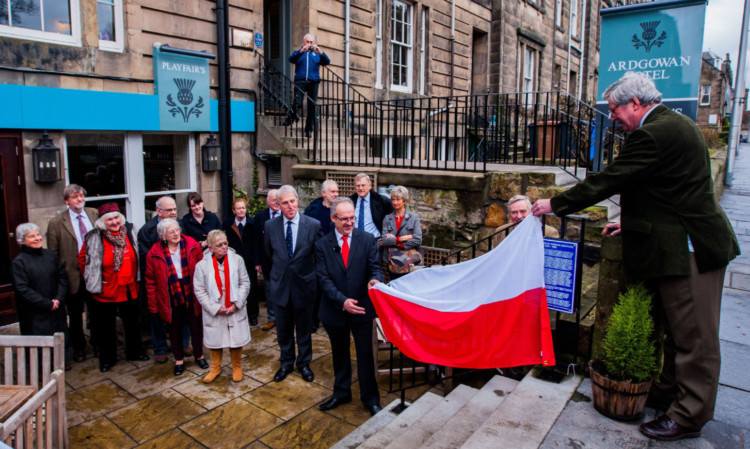An unsung hero of the Second World War was remembered in St Andrews when two memorial plaques were unveiled at the Ardgowan Hotel.
Flight Lieutenant Josef Kozacki, who was stationed in St Andrews, was responsible for the invention of a land-mine detector that saved countless thousands of lives and limbs.
The first 500 detectors were sent to North Africa in time for the Battle of El Alamein and the basic design was still in use in the 1991 Gulf War.
Flt Lt Kozacki was one of the Polish military personnel stationed on Scotland’s east coast, building crucial defences against a feared German invasion after the defeat of Poland and the retreat from Dunkirk.
In 1937 he had been commissioned to develop an electronic machine capable of detecting unexploded “duds” on firing ranges.
During the war he altered the purpose of his machine to detect land mines.
Flt Lt Kozacki was given a laboratory workshop in the hotel, then part of the Polish Army HQ in the town, to finish the detector.
Prototypes were tested on the West Sands. They weighed 30lb and were portable, reliable, effective and relatively easy to maintain in the field.
Flt Lt Kozacki received neither payment nor recognition save for a treasured letter from King George VI.
After the war he returned to his native Poland where he became one of the pioneers of electronic and nuclear machinery and a professor at the Military Academy in Warsaw.
He died at the age of 81 and was buried with full military honours.
Details about the professor and how his detector worked can be found on the plaques, which are written in English and Polish.
The plaques were unveiled by Edinburgh’s Polish Consulate General Dariusz Ardler, who was also shown other memorabilia of Polish soldiers stationed in the town, such as the mosaic at the Town Hall in Queen’s Gardens and the bust of General Sikorski in Kinburn Park.
He was also guest at a private reception, courtesy of the Ardgowan Hotel.
The plaques to Flt Lt Kozacki were provided by the St Andrews Preservation Trust, with the funds coming from the Gordon Christie bequest.
Mr Christie, a well-known toy shop owner and local historian, was a devoted trust member.On his death he left a substantial bequest to be spent on plaques to remember prominent people in the town’s history.
